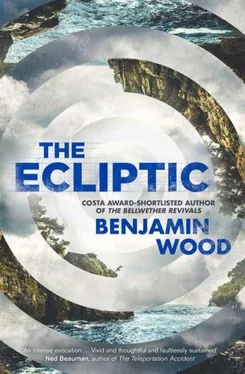
I found the boy at the front of his lodging, perched on an upturned crate. In his part of the grounds, there was still abundant sunshine, but Fullerton had somehow arranged himself in the smallest patch of shade, at the very corner of the building. He was leaning back against the cinderblocks, knees up, scribbling on a length of narrow paper, the tails of which were hanging over his shins. It was clear that I had caught him in the wake of inspiration but I was too close to turn back.
When I reached his doorway, I held the jeton above my head, pinched between two fingers, as though it were a white flag. I intended to say nothing, but he stopped what he was doing and called out: ‘What do you want?’
‘I have a delivery.’
I flicked the token at him, thinking he would catch it. Instead, it hit the concrete and rolled towards his feet. He stopped it with his boot.
‘Next time you get frightened by a butterfly,’ I said, ‘do me a favour and throw a cushion instead.’
‘It was a moth,’ he said flatly. ‘And I’m not frightened of them.’
I could see now that he was writing on a stack of index cards that had been taped together, end to end. When he stood up, the whole set sprang outwards like the bellows of a concertina. He laid them on the crate. For a second or two, he scrutinised the jeton , bearing it to the light. Then he put it on his thumb and catapulted it back to me. ‘Thanks, but I’ve got one already.’
I clutched it from the air. ‘It’s yours — the one you threw. Ardak found it.’
‘Must be someone else’s.’ The boy reached into his jeans. He drew out another jeton and displayed it on his palm: a newer, brighter version of the faded thing I held in mine. ‘Believe me now?’
‘Well, I don’t know who else it could belong to.’
‘Try harder.’ He moved the crate along half a yard, fussing over its position, until he had it in the right amount of gloom. Then he gathered up his stack of cards again, flip-booking their edges with his fingers. ‘You know, I’m starting to understand why you’ve been here so long, Knell. You make a lot of friendly house calls, but you don’t seem to do much painting.’
I knew that he was trying to deflect me before I got too settled in his presence. It was a tactic I had often used myself with the short-termers. ‘I work at night,’ I told him.
‘Like a moth, you mean.’ He attempted a smile. ‘Honestly, I’m not scared of them. I just hate the stupid things, the way they move. I hate tipping them out of lampshades. I hate watching them fail. So I put them out of their misery.’
‘You’re a complicated boy,’ I said.
‘I know.’ He sat down in the same hunched manner as before, unravelling his chain of cards; I could see the yellowed tape on the reverse of them. He resumed his work as though nothing had curtailed it. The motion of his pen seemed automatic as he scrawled away on each card, gliding from edge to edge, top to bottom. When one card was done, he lifted it, bringing up the next part of the link; he filled that, too, and another. Not once did he peer down to check what he was writing. His gaze was fixed upon the hinterland between our lodgings and the bare pomegranate trees. In turn, I could do nothing but marvel at his productivity.
At first, he did not respond to my staring. His pen gathered speed, making a noise like knitting needles. The cards collected themselves into a tidy pack between his feet. Then he said, ‘If you’re just going to stand there, gawking, you’re in for a long afternoon.’
I was used to his forthrightness by now, but he still had the knack of putting me off-kilter. He was a fascinating thing to watch at work, a collision of focus and detachment. ‘Don’t you need your guitar?’ I asked.
He dipped his head towards the ground. When he looked up again, his bottom lip was sucked under his teeth. He blinked once, heavy and protracted. ‘OK,’ he said, ‘now you’re definitely annoying me,’ and reeled in the line of cards, hand over hand, as though bringing up an anchor. ‘It’s funny, I was just thinking of my granddad. He used to read the papers and get all worked up about the drug addicts in the articles. He reckoned the best way to solve their problems was to lock them all up in one big house with all the finest heroin and clean needles they could want — no food, no TV, no water, no getting out, just round-the-clock heroin, the good stuff. He reckoned that after a week or so, half of them would overdose — no big loss, according to him — and the rest would get so bored of taking heroin they’d never touch the stuff again. He thought it was the chase they were addicted to, bless him. The lifestyle. Stupid, right?’
‘Just a bit.’
‘Well, here’s what’s funny about it: I’ve been here two days, and I’m starting to think he wasn’t all that loony.’ The boy took five quick strides towards me, boot soles clapping the cement.
‘I don’t really see your point.’
He flipped the edges of his cards again. ‘I mean, that’s the reason we’re all here, isn’t it? The making part is what we’re addicted to, the struggle, the day to day. Our drug isn’t the actual fix, if you get what I’m saying.’
‘Partly,’ I said. ‘But I don’t believe that painting is an addiction. It’s always felt more like a survival technique.’
This appeared to have some effect on the boy’s opinion of me. He peered down at his stack of cards, nodding, as though some silent plan had been decided upon. Then he offered them to me. ‘Go on — have look if you want. We’ll consider it a trade.’
‘For what exactly?’
‘For being so nice to me. I know it isn’t easy’ But just as I was reaching for the cards, he lifted them away, as though withholding ice cream from a child. ‘Just messing,’ he said with a smirk, lowering his arm again.
There must have been a few hundred cards in total and they had a surprising heft. I skimmed through the entire set while the boy stood at my shoulder, breathing loudly. Barring the last twenty or thirty, which were blank, every card was covered with inscrutable Japanese characters.

‘So?’ he said, and made a platform with his hand. ‘What’s the verdict?’
I placed the cards back on his palm. He had that same affected look of innocence — head down and to the side — that I had seen once before, when he had bragged about gambling with Cypriots. ‘Another thing you learned from picture books, I take it.’
‘Sort of.’ His pulse was visible in his neck, depressing and returning like a switch. There was an oiled quality about his complexion in the shade, too, an awkward teenage lustre. ‘It’s a pretty difficult language,’ he said. ‘I don’t understand a word of it.’
‘You’re lying.’
He shook his head. ‘I’m really not.’
‘Then how do you know what you’re writing?’
‘I don’t. I just scribble it down and ask questions later.’ He shrugged, acknowledging his strangeness. ‘It looks like it might be real Japanese this time, but I wouldn’t bet on it. There’s always ten cards of gibberish in my head for every one that makes sense.’
‘So where does it all come from?’
He tapped his forehead. ‘Certain things just stick with me.’
‘Like backgammon.’
‘Yeah, in a way.’ He must have thought I was trying to challenge him somehow, because he took a step back, and said, ‘I’ve got to get it down on paper while it’s still fresh, or it just breaks up into all these little pieces. Then it gets harder to remember. I can’t explain it any better than that.’
Читать дальше














